
Current Cardiovascular Risk Reports
Scope & Guideline
Empowering professionals with timely cardiovascular insights.
Introduction
Aims and Scopes
- Cardiovascular Risk Assessment and Management:
The journal emphasizes studies that assess various cardiovascular risk factors, including genetic, lifestyle, and social determinants, providing strategies for effective management. - Technological Innovations in Cardiology:
There is a strong focus on the application of technology, such as artificial intelligence, digital health, and telemedicine, in improving diagnosis, treatment, and patient monitoring in cardiovascular care. - Health Equity and Disparities:
A significant aspect of the journal's scope is addressing racial and ethnic disparities in cardiovascular health, emphasizing the need for equitable healthcare solutions. - Women's Cardiovascular Health:
The journal pays particular attention to cardiovascular issues specific to women, investigating risk factors, treatment responses, and outcomes. - Preventive Strategies and Lifestyle Interventions:
Research on preventive measures, including lifestyle modifications and community-based interventions, is a core area of interest, aiming to reduce cardiovascular disease incidence.
Trending and Emerging
- Artificial Intelligence in Cardiovascular Care:
Recent publications highlight the increasing integration of AI for risk assessment, diagnosis, and treatment strategies in cardiovascular medicine, showcasing its potential to enhance clinical outcomes. - Digital Health and Remote Monitoring:
There is a growing emphasis on digital health solutions, including remote patient monitoring and telemedicine, as essential tools for managing cardiovascular diseases and improving patient engagement. - Health Equity and Social Determinants of Health:
Research focusing on health equity, particularly regarding racial and ethnic disparities in cardiovascular health, has gained momentum, highlighting the importance of addressing social determinants. - Innovative Treatment Approaches:
The journal is increasingly publishing studies on novel treatment strategies such as neuromodulation and hybrid ablation techniques, indicating a shift towards more advanced procedural approaches. - Integrative Lifestyle and Behavioral Interventions:
There is a rising trend in exploring lifestyle modifications and behavioral interventions as part of comprehensive cardiovascular risk management, emphasizing holistic patient care.
Declining or Waning
- Traditional Risk Factors Focus:
There appears to be a waning emphasis on traditional cardiovascular risk factors such as hypertension and hyperlipidemia, as newer methodologies and technologies gain traction in research. - Generalized Cardiovascular Risk Management:
The publications show a decreasing focus on generalized risk management approaches, moving towards more personalized and technology-driven strategies. - Basic Cardiovascular Physiology:
Research articles that deal with fundamental aspects of cardiovascular physiology have become less frequent, as the journal shifts towards applied and innovative research. - Pharmacological Approaches without Technological Integration:
There is a noticeable decline in studies that focus solely on pharmacological interventions without considering the integration of technological advancements or digital health solutions.
Similar Journals
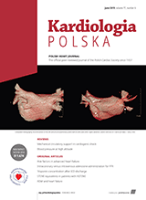
Kardiologia Polska
Connecting Global Minds in Heart Health ResearchKardiologia Polska, the esteemed journal of the Polish Cardiac Society, has established itself as a vital resource in the field of cardiology and cardiovascular medicine since its inception in 1954. With an ISSN of 0022-9032 and an E-ISSN of 1897-4279, this journal serves as a platform for groundbreaking research and scholarly articles that contribute to the advancement of heart health. Although currently not an open access journal, it remains an essential reference for practitioners and researchers seeking to stay abreast of the latest developments in cardiovascular science. The journal reflects its scholarly depth through a Category Quartile of Q3 and a commendable Scopus ranking at the 48th percentile in its field. Published primarily in Poland, it caters to a global audience eager to explore comprehensive studies spanning clinical cardiology, innovative therapeutic approaches, and emerging cardiovascular trends. Join a thriving academic community by engaging with the invaluable insights and research contributions found within the pages of Kardiologia Polska.
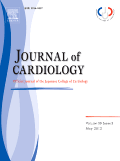
Journal of Cardiology
Exploring the frontiers of heart health and innovation.Journal of Cardiology, published by ELSEVIER, stands as a prominent resource in the field of cardiology and cardiovascular medicine. With a rich history since its inception in 1987, this peer-reviewed journal aims to disseminate cutting-edge research that enhances the understanding and treatment of cardiovascular diseases. Its 2023 ranking places it in the Q2 category within its discipline, reflecting its significance and impact, as evidenced by a Scopus rank of #123 out of 387 journals, positioning it in the 68th percentile of its field. The journal is headquartered in Japan, providing a unique perspective on cardiological advances relevant not only to the Asian continent but also globally. Though it does not currently offer open access, the Journal of Cardiology remains a vital institutional resource for researchers, clinicians, and students seeking to push the boundaries of cardiovascular science and improve patient outcomes.
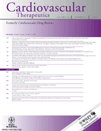
Cardiovascular Therapeutics
Advancing Cardiovascular Care Through Open Access ResearchCardiovascular Therapeutics is a renowned Open Access journal, published by WILEY-HINDAWI, that has been at the forefront of advancing knowledge in the field of cardiology and cardiovascular medicine since its establishment. With a strong commitment to disseminating high-quality research, the journal has successfully positioned itself within the Q2 quartile in multiple categories, including Cardiology and Cardiovascular Medicine, Medicine (miscellaneous), and Pharmacology. The journal is indexed in Scopus, achieving impressive rankings, such as #95 out of 387 in Cardiology, and #87 out of 272 in Medical Pharmacology. Situated in the United Kingdom, Cardiovascular Therapeutics embraces an Open Access model since 2019, ensuring that groundbreaking research is accessible to researchers, practitioners, and students across the globe. The journal is dedicated to publishing original research articles, reviews, and clinical studies that contribute to the understanding and treatment of cardiovascular diseases, making it an essential resource for those invested in improving patient outcomes and advancing therapeutic strategies in this vital area of medicine.
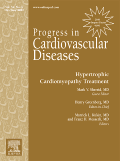
PROGRESS IN CARDIOVASCULAR DISEASES
Unveiling Innovations in Heart HealthPROGRESS IN CARDIOVASCULAR DISEASES is a leading journal in the field of cardiology and cardiovascular medicine, published by W B SAUNDERS CO-ELSEVIER INC. With an impressive impact factor that places it in the esteemed Q1 quartile of its category, this journal ranks among the top 32 out of 387 journals in its field, positioning itself in the 91st percentile. Since its inception in 1958 and continuing until 2024, it has been a prolific source of cutting-edge research, reviews, and clinical insights that contribute significantly to the understanding and treatment of cardiovascular diseases. Although it does not currently offer open access options, the journal's rigorous peer-review process ensures that all published content meets the highest standards of scientific excellence. As a key resource for researchers, practitioners, and students alike, PROGRESS IN CARDIOVASCULAR DISEASES serves as an indispensable tool for advancing knowledge and practice in cardiovascular health.
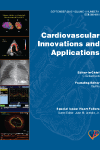
Cardiovascular Innovations and Applications
Connecting researchers and practitioners to elevate cardiovascular medicine.Cardiovascular Innovations and Applications is a premier open-access journal dedicated to advancing knowledge in the field of cardiovascular medicine. Published by COMPUSCRIPT since 2016, this journal provides a platform for the dissemination of innovative research and applications that address crucial topics in cardiology, aiming to bridge the gap between clinical practice and cutting-edge research. With an ISSN of 2009-8618 and an E-ISSN of 2009-8782, it operates on a global scale, facilitating access to high-quality content without financial barriers. The journal is positioned within the Medicine - Cardiology and Cardiovascular Medicine category, and its current Scopus rank of #321/387 reflects its potential for growth and influence in the academic community, being in the 17th percentile. Researchers, healthcare professionals, and students will find Cardiovascular Innovations and Applications an invaluable resource in their quest for the latest findings and advancements in cardiovascular health and treatment methodologies.

Current Atherosclerosis Reports
Empowering clinicians with cutting-edge findings.Current Atherosclerosis Reports, published by CURRENT MEDICINE GROUP, is a leading scientific journal in the field of Cardiology and Cardiovascular Medicine, boasting an impressive Q1 ranking in its category as of 2023. This esteemed journal, with an ISSN of 1523-3804 and an E-ISSN of 1534-6242, has been a cornerstone of cardiovascular research since its inception in 1999, continuing to publish cutting-edge studies through 2024. With unparalleled insights into the mechanisms, prevention, and treatment of atherosclerosis, it serves as an essential resource for researchers, healthcare professionals, and students alike. Although not an open-access journal, it is highly regarded within the academic community, highlighted by its Scopus rank of #54 out of 387 in its field, placing it in the 86th percentile. The journal's commitment to advancing knowledge in cardiovascular health underscores its integral role in guiding clinical practices and influencing future research directions.

HEART
Advancing Cardiovascular Knowledge for a Healthier TomorrowHEART is a leading peer-reviewed journal published by the BMJ Publishing Group, specializing in the field of Cardiology and Cardiovascular Medicine. Established in 1942, the journal has evolved as a premier platform for disseminating high-quality research, innovative practices, and clinical advancements within the cardiovascular domain. With an impressive impact factor and ranked in the Q1 category in 2023, it positions itself among the top-tier journals in its field, boasting a Scopus rank of #37 out of 387 in this highly competitive area, representing the top 10th percentile nationally. The journal supports both traditional and open access options, thereby enhancing the global visibility and reach of its published work. Researchers, professionals, and students alike will find HEART to be an invaluable resource, offering the latest insights and developments that drive the field forward and improve patient care worldwide.
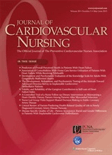
Journal of Cardiovascular Nursing
Innovating Practices for Better Cardiovascular OutcomesThe Journal of Cardiovascular Nursing, published by Lippincott Williams & Wilkins, is a leading peer-reviewed journal in the field of cardiovascular nursing, holding a prestigious Q1 ranking in Advanced and Specialized Nursing and a Q2 ranking in Cardiology and Cardiovascular Medicine as of 2023. With an ISSN of 0889-4655 and an E-ISSN of 1550-5049, this journal has been a cornerstone for researchers and clinicians since its inception in 1986, providing vital contributions to the evolving landscape of cardiovascular care. The journal's significant impact factor underscores its role in disseminating high-quality research that informs best practices and enhances patient outcomes in cardiovascular health. While it does not currently offer open access options, the journal remains a crucial resource housed in the prestigious Scopus database, ranked 8th out of 63 in Advanced and Specialized Nursing and 187th out of 387 in Cardiology and Cardiovascular Medicine. By promoting interdisciplinary collaboration and advanced nursing techniques, the Journal of Cardiovascular Nursing is committed to improving care for patients with cardiovascular diseases.
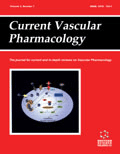
Current Vascular Pharmacology
Shaping the Future of Cardiovascular Pharmacological ResearchCurrent Vascular Pharmacology is a premier academic journal published by Bentham Science Publications Ltd, focusing on the intersection of pharmacology and cardiovascular medicine. With an impact factor that reflects its significance in the field, this journal ranks in the Q1 category for both Pharmacology and Cardiology, showcasing its dedication to high-quality research. Its Scopus ranks place it in the top percentile of its categories, highlighting its influence among scholars and practitioners alike. Issued since 2003 and continuing through 2024, Current Vascular Pharmacology aims to disseminate cutting-edge findings and foster knowledge exchange among researchers, professionals, and students engaged in cardiovascular pharmacology. Despite being a subscription-based journal, it remains a vital resource for those seeking the latest advancements in drug development and therapeutic interventions for vascular diseases. Located in the United Arab Emirates, the journal serves as an essential platform for global discourse on vascular health.
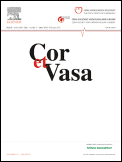
COR ET VASA
Fostering insights in cardiovascular medicine for over six decades.COR ET VASA is a prominent peer-reviewed journal in the field of cardiology and cardiovascular medicine, published by the Czech Society of Cardiology and Czech Society of Cardiovascular Surgery. Established in 1961, and continuing its legacy from 2006 to 2024, this journal serves as an essential platform for disseminating significant research findings, clinical studies, and innovative treatments in cardiovascular health. While currently positioned in the Q4 quartile, the journal aims to enhance its impact by fostering knowledge sharing among researchers, clinicians, and students alike. The journal, with its publication in Czech Republic, provides a unique perspective to the European cardiovascular community, allowing for invaluable insights and discourse. Researchers are encouraged to submit their manuscripts and contribute to the growing body of knowledge in this critical area, although it should be noted that COR ET VASA does not offer open access options at this time. As the field of cardiovascular medicine evolves, COR ET VASA remains committed to addressing the latest challenges and advancements, nurturing a rich dialogue within the community.